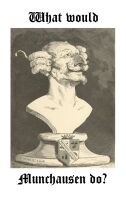|
by H.P. Lovecraft Introduction by Robert Bloch  Most of the best work of the master of cosmic horror
Most of the best work of the master of cosmic horror
Horror fiction usually derives its power from the presentation of entities which can be defined as "unnatural": vampires and zombies returning from the dead, the spirits of the deceased, werewolves and other creatures which break down the barrier between human and animal. Conversely, much of the best science fiction begins with a scientific fact or theory about the physical world and develops it beyond what is currently possible or known, and explores possible versions of our evolutionary future, life on other planets, and our place in the cosmos. Lovecraft's greatness is that the horror in his best fiction arises from what is known about the natural world, and our place in it. His is an existential horror, a "cosmic horror," arising out of our reaction to the vast reaches of empty space and our insignificance. Humanity is but a small part of the universe, our efforts are doomed to failure, and our civilization, the end result of thousands of years of learning facts and recording history, is doomed. Indeed, science and history are often the cause of our demise in Lovecraft's work: too often, researchers stumble across some fact that drives its discoverers mad, because of what it demonstrates about our frailty. Lovecraft was not content with writing "mere" stories of invasion by alien forces, however: his extraterrestrials are subject to the same forces as ourselves, and we often have much in common with them. Certainly many of Lovecraft's alien species are terrible to us, but often they are just as pathetic as we are, since they are subject, as we are, to the fickle forces of natural selection, to pride, and to blindness. The Great Race from "The Shadow Out of Time" and the Old Ones of "At the Mountains of Madness" (not, alas, in this collection) have a need for the pursuit of intellectual knowledge and an ignorance of real-world affairs which make them more similar to Shakespeare's Prospero than to Caliban. Unlike Shakespeare's play, in these narratives it is Caliban, not Prospero, who generally wins the struggle. Lovecraft applied the Darwinian concept of the survival of the fittest to Spenglerian notions of the rise and fall of civilization, thus providing a double blow to the idea of evolution as progress: even the most advanced and intelligent cultures are doomed, according to this notion of history. Not even physical or intellectual superiority can preserve a society against inevitable decline, especially when this decline combines with the random forces of natural selection. This inevitable senescence is only part of the horror of Lovecraft's fictions. His other theme is the smallness and unimportance of our species in the grand scheme of things. Even those protagonists who survive the horrors described in these tales are ever after unfit for civilized life, knowing as they could not have before that human life is insignificant, subject to random forces and loathsome creatures from outside this world who dissect us like lab rats, devour us like cattle, or somehow convince our species to commingle sexually with theirs. It is rare that a Lovecraftian protagonist, once he looks into the dark, can bear the light again. In this, his heroes are like Marlow of Conrad's "Heart of Darkness" or Prendick of Well's Island of Dr. Moreau: their experiences make them almost unfit for life in civilization, and Lovecraft's protagonists generally go mad because they have shone the light of science too far into the darkness. This anthology, then, is a very good collection of some of Lovecraft's finest work; there are a few weak pieces, but his best tales, except the aforementioned "At the Mountains of Madness," are all represented here (had this novella been included, I would have given this collection five stars). Every time I read these stories, I shiver not only because the aliens represented herein might lurk in some dark corner of the house, but because they remind us of the greater darkness which surrounds us, and of our insignificant place in the cosmos. |

